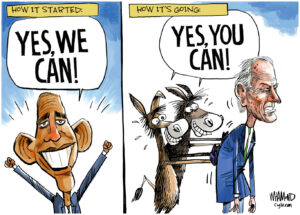A Legacy We Dare Not Leave
You might not have noticed that another round of UN climate talks is under way, this time in Doha, Qatar You also might not have noticed that we're barreling toward a "world of unprecedented heat waves, severe drought, and major floods in many regions" Here in Washington, we're too busy to pay attention to such trifles.You might not have noticed that another round of U.N. climate talks is under way, this time in Doha, Qatar. You also might not have noticed that we’re barreling toward a “world … of unprecedented heat waves, severe drought, and major floods in many regions.” Here in Washington, we’re too busy to pay attention to such trifles.
We’re too busy arguing about who gets credit or blame for teeny-weeny changes in the tax code. Meanwhile, evidence mounts that the legacy we pass along to future generations will be a parboiled planet.
That quote about heat, drought and flooding comes from a new World Bank report warning of the consequences of warming. The study, titled “Turn Down the Heat,” tries to assess what will happen if temperatures are allowed to rise by 4 degrees Celsius — about 7.2 degrees Fahrenheit — above pre-industrial levels, before humans began spewing massive amounts of heat-trapping carbon dioxide into the atmosphere. The picture is beyond bleak.
We’re talking about a world in which extreme weather events become commonplace — tropical cyclones that devastate coastal cities unaccustomed to such storms, punishing summer temperatures in regions unprepared to cope. In other words, lots more of the anomalous phenomena we’ve already been experiencing, such as the 2010 heat wave in Russia that caused thousands of deaths.
We’re talking about a sea-level rise of up to 3 feet. Recall what Hurricane Sandy did to New York City and the New Jersey coastline. Now imagine the storm surge being 3 feet higher than it was.
Developed nations will, of course, find ways to deal with living in a warmer world. But the story is likely to be different in poorer countries, which will struggle to deal with lower crop yields, possible water shortages and stressed ecosystems. The World Bank report notes, almost as an aside, that “some areas in sub-Saharan Africa may face a 50 percent increase in the probability for malaria transmission” because disease-carrying species of mosquitoes will be able to survive in areas that now are inhospitable.
“The picture that emerges challenges an often-implicit assumption that climate change will not significantly undermine economic growth,” the report says. “It seems clear that climate change … could seriously undermine poverty alleviation in many regions.”
Why does this matter to us? Even if you look past the moral implications, it is predictable that major dislocations in developing countries will lead to instability and conflict. Such chaos, in this day and age, is never strictly local. It will be felt even in countries rich enough to live in air-conditioned splendor behind protective sea walls.
“Only early, cooperative, international actions” can avoid catastrophic warming, the report concludes. But its assessment of the likelihood of such action is far from sunny.
What results have two decades’ worth of international climate confabs produced? By the World Bank’s reckoning, even if the nations of the world meet the pledges they have made to reduce carbon emissions, we’re still likely to see warming of more than 3 degrees Celsius — 5.4 degrees Fahrenheit — by 2100. And if the pledges are not met, which seems a reasonable assumption, there is a 40 percent chance that by the turn of the next century, temperature rise will reach the disaster benchmark of 4 degrees Celsius.
Americans are not the big problem — but must be part of the solution.
The United States has never agreed to abide by the Kyoto Protocol, the binding 1997 treaty through which some countries agreed to limit emissions. Still, U.S. emissions have risen only slightly since then. The big increase has been in China and India, which are exempt from cuts under Kyoto.
Officials in Beijing and New Delhi understand that unchecked growth in emissions is not sustainable. But they also know that the United States and Europe are still responsible for far more carbon emissions per capita. And if a factory in, say, Guangzhou province produces iPhones for American consumers, who should be held responsible for those emissions?
Will these questions be answered in the Doha talks now under way? Not a chance. Not until the United States is fully involved.
And this is why President Obama should devote his next State of the Union address to climate change. He understands the science and knows the threat is real. Convincing the American people of this truth would be a great accomplishment — and perhaps the most important legacy of his second term.
Eugene Robinson’s e-mail address is eugenerobinson(at)washpost.com.
© 2012, Washington Post Writers Group
Your support matters…Independent journalism is under threat and overshadowed by heavily funded mainstream media.
You can help level the playing field. Become a member.
Your tax-deductible contribution keeps us digging beneath the headlines to give you thought-provoking, investigative reporting and analysis that unearths what's really happening- without compromise.
Give today to support our courageous, independent journalists.








You need to be a supporter to comment.
There are currently no responses to this article.
Be the first to respond.